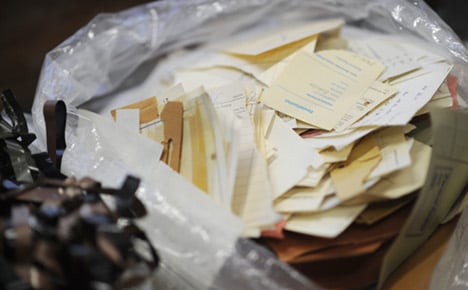A computer system which can digitally recreate documents by scanning bits of paper that were shredded or torn by hand as the former East Germany collapsed, is nearing the end of its test phase.
While the eyes of the world were fixed on euphoric Berliners attacking with pickaxes the hated Wall that had spliced the city and country in two for 28 years, destruction of another kind was underway far from public gaze.
Stasi employees began destroying their secret files as the Berlin Wall fell in November 1989, initially shredding them, but as the machines broke down under the strain, they were forced to tear documents by hand.
The waste was to be pulped or burnt but “citizen committees” stormed Stasi offices across East Germany, seizing millions of files, along with 15,500 bags of torn-up documents.
Each bag was stuffed with between 50,000 to 80,000 bits of paper – with potential insight into decades of inquiries and interrogations by the former communist regime’s feared secret police.
And in 1995, the work to re-build these archives began – by hand. Germans are generally keen to come to terms with their past. Since the Stasi’s archives first opened to the public 20 years ago, the federal office in charge of Stasi archives has received 2.83 million requests for information.
“In 2000, the Bundestag lower house of parliament asked us to look for ways to speed up this reconstruction (work),” Joachim Häussler, one of those in charge of the programme at the federal office, told AFP.
Bertram Nikolay, an engineer at the Fraunhofer Institute research organisation, said they decided to take up the challenge and he came up with the idea for a computer-aided virtual reconstruction.
An experimental machine was initially introduced before a pilot project was launched in early 2007, Häussler said, from his set-up in the former headquarters of the Stasi, now an archive centre and museum in a grey district of east Berlin.
Seated next to him around large tables were six co-workers silently at work emptying the bags under a glaring neon light.
They first sort through the pieces themselves and put them into different boxes before the computer takes over, scanning the pieces, using criteria such as the colour and style of the paper, the character type or writing style to rebuild the destroyed pages.
“So far we have digitalised the contents of 70 bags,” Nikolay said, adding that when the test phase is finished in several months’ time, the contents of 400 bags are due to be pieced back together.
A total of €8 million of public funds has been poured into testing the computer system and more will be needed to move onto the next stage, although exactly how much more is not yet known.
Nikolay predicted the digital reconstruction of Stasi documents would begin in earnest next year at the earliest, or more likely in 2014, saying he sees a real political will to see through the process.
Public demand for information concerning the archives certainly does not seem to be waning with the passing of time – in 2011 alone, 80,611 new requests were lodged.
AFP/mdm



 Please whitelist us to continue reading.
Please whitelist us to continue reading.
Member comments